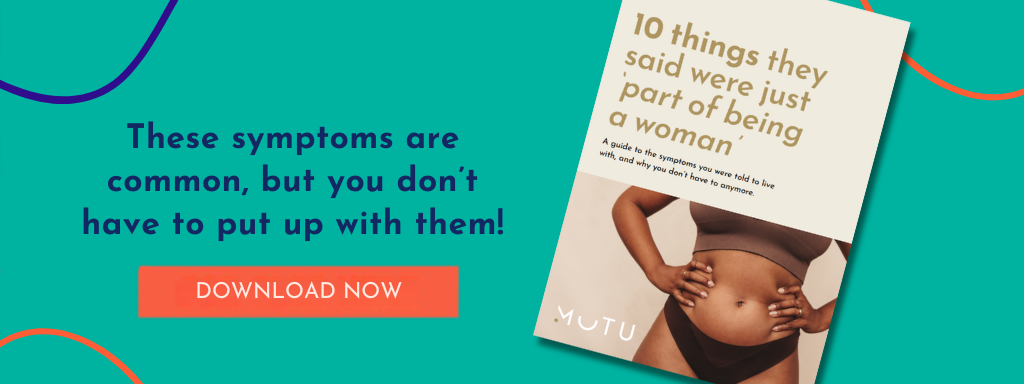Incontinence and postnatal body issues are major health concerns for women, costing the NHS up to £233 million per year. They harm women’s dignity, have a huge impact on mental health, and can ruin lives for years. However, many women aren’t aware that this misery is treatable.
Through a recent study, we proved that these conditions can be improved by women in their own homes, without expensive medical intervention.
MUTU launched a national 30-day #PelvicFloorChallenge campaign to encourage women to improve their pelvic floor and open up discussions about postnatal body issues.
50% of women will suffer from incontinence at some point in their adult lives. For a woman who develops postnatal incontinence in her 30s, this could mean 50 years of bladder weakness.
Contrary to popular belief, this is not an ‘old woman’s problem’. Almost 1 in 4 women between the ages of 18 and 44 experience incontinence. 37% of women have wet themselves at work within the last month. Of those, 21% wet themselves weekly and almost 1 in 10 daily while at work.
PelvicFloorChallenge
Designed to combat this and raise awareness of the issue of bladder weakness, the 30-day #PelvicFloorChallenge encourages women to put six minutes aside each day to start to heal their pelvic floor by following a free-to-use, step-by-step video guide.
Wendy Powell, CEO and founder of MUTU System, comments:
“For many women, this situation is preventable. With the right information and exercises, women suffering from postnatal issues such as incontinence, diastasis recti, or pelvic organ prolapse can, in most cases, be treated by themselves at home and even have their condition reversed. We hope that the 30-day Pelvic Floor Challenge will help show women what is possible and encourage them to talk about the issue.”
Female health issues
Female health issues, such as incontinence, diastasis recti (abdominal muscle separation), or pelvic organ prolapse, are among the last personal health taboos. The stigma attached makes 75% of women with incontinence suffer in silence. Those that do seek help take on average 6.5 years 10 to do so. This seriously impacts mental health, doubling the risk of postnatal depression. Sufferers may feel humiliation, shame or anxiety about becoming incontinent in public and distress at others finding out.
PANDAS
Commenting on the impact that physical health conditions can have on women’s mental health, Annie Belasco, Head of PR, Fundraising and Helpline at PANDAS Foundation, said:
“As a charity specialising in postnatal and antenatal depression, we understand that the physical demands of pregnancy, birth and motherhood can have a serious impact on women’s mental health. ‘Baby blues’ can be a dangerous assumption of low mood and changing behaviour after having a baby and it is important to raise awareness around this issue, and the physical symptoms that can often be linked to these low moods. We know how closely physical and mental health are linked and that’s why campaigns like MUTU System’s 30 Day Challenge, which encourage mums to take time to care for themselves, are so important.”
The cost
In addition to the impact bladder weakness can have on women’s mental health, it is also a costly condition to live with. Women with bladder weakness spend on average £548* a year on sanitary items to deal with the symptoms.
The available medical options can be daunting and controversial. Invasive and expensive treatment options, such as vaginal mesh and vaginal rejuvenation devices are high-risk and often unnecessary. In fact, the National Institute for Health and Care Excellence (NICE) has issued draft guidance that vaginal mesh surgery should only be used as a last resort for treating pelvic organ prolapse and urinary incontinence.
Wendy Powell continues:
“The high profile failings of vaginal mesh surgery have put incontinence back in the spotlight, but the sheer number of women suffering in silence reveals a desperate lack of understanding about available and appropriate treatment options. Women need to know that it doesn’t have to be like that and there are highly effective steps they can take themselves to improve their condition.”
MUTU System Survey Results
Our recent study of 906 women with varying postnatal body issues, has clearly demonstrated that these problems can be improved.
Our survey was conducted with women who had completed at least 6 weeks of our 12 week programme.
97% of women who couldn’t successfully locate or engage their pelvic floor muscles before, were able to after using the MUTU System platform
After using MUTU System 92 % of women reported an improvement in bladder symptoms including urinary leakage
After using MUTU System 88 % of women reported an improvement in symptoms of pelvic organ prolapse
After using MUTU System 94 % of women reported an improvement in signs and symptoms of diastasis recti, separation of the stomach muscles
After using MUTU System 89 % of women experienced an improvement in sexual symptoms; pain/discomfort during/after intercourse
After using MUTU System 94 % of women felt an improvement in how they able felt about their body and what it is able to do
Medical comments
Dr Anita Kulkarni a surgeon who specialises in Women’s Health comments:
“I see mums in my practice all the time and I always recommend that they start with non-surgical treatment before considering surgery, and the MUTU System is my go-to recommendation.”
Camilla Lawrence, Senior Women’s Health Physiotherapist at Six Physio in London, comments:
“Women’s Health Physiotherapists routinely assess and treat Rectus Divarification and Pelvic Floor dysfunction, but there are few really good and safe training systems out there that not only help both these issues long-term but also cover nutrition, posture retraining, general strength and fitness work too – MUTU System really is a complete holistic package. My patients frequently go on to use it after they have finished treatment with me, and love how it takes them to the next level and how it is completely possible to do – even with a baby (or 4!) at home and minimal time on their hands. I can’t recommend it more.”
Wendy Powell comments:
“The psychological impact of incontinence is huge. It is unacceptable that women are living long-term with such distressing symptoms. Every woman deserves the dignity of a body that works and makes her feel good, and our research has shown that real change can be brought about with the right approach, without the need for medical interventions. Women can heal their bodies instead of using sanitary products long term, or resigning themselves to years of misery.”
*906 women who use the MUTU System programme completed a surveymonkey survey during October 2018.
- Calculation based on average use of 3 pads per day at 50 pence each.
Featured in
On Thursday 24th January 2
019 Wendy Powell, CEO and Founder of
MUTU System, appeared on BBC Radio 4 Woman’s Hour talking about our #PelvicFloorChallenge













